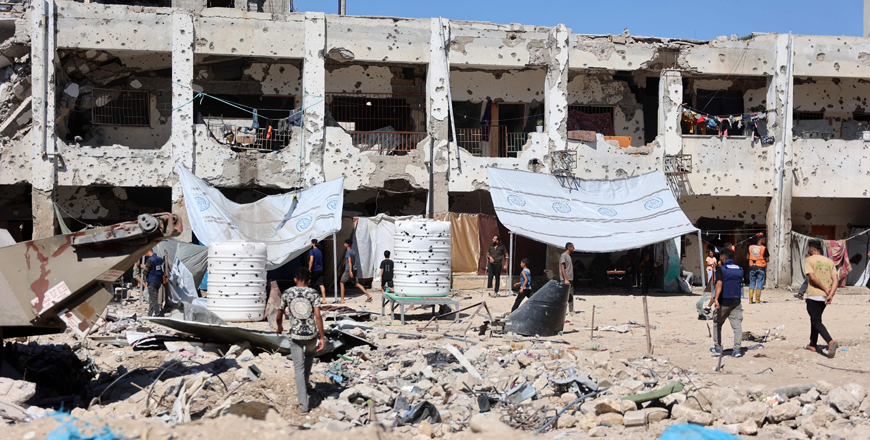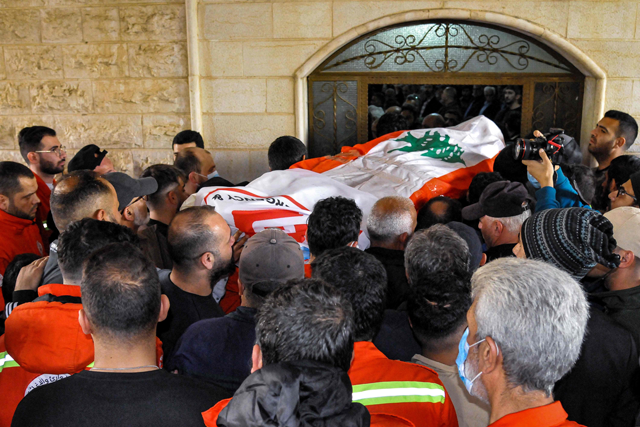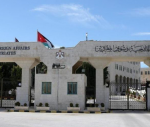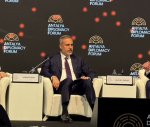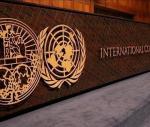You are here
365 dead in Israeli strikes on Hizbollah strongholds in Lebanon
By AFP - Sep 23,2024 - Last updated at Sep 23,2024
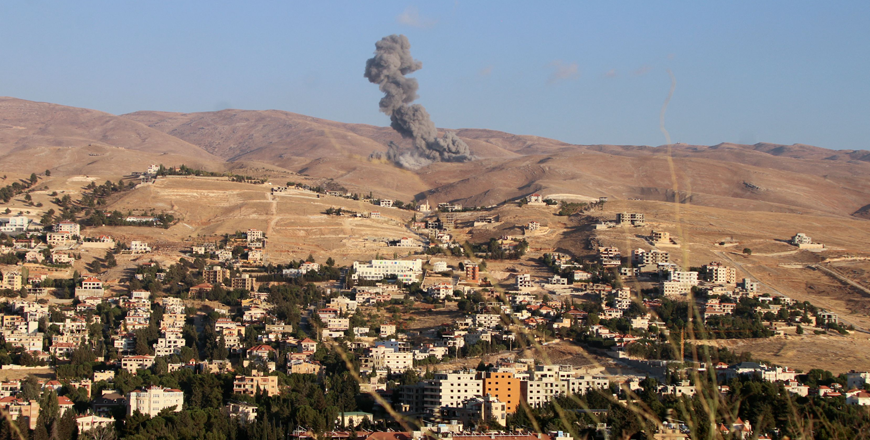
Smoke billows from the site of an Israeli airstrike on the eastern areas of Baalbeck in the Bekaa valley in Lebanon on Monday (AFP photo)
BEIRUT, NEW YORK — Lebanon said more than 350 people including 24 children had been killed in Israeli strikes on the country's east and south Monday, the deadliest day in nearly a year of cross-border clashes.
"Israeli enemy strikes on towns and villages in southern Lebanon, the Bekaa and Baalbek" in the east, "killed 356 people, including 24 children and 42 women, and injured 1,246" others, the health ministry said in a statement.
War began when Hamas carried out the worst-ever attack on Israel, with Hizbollah and other Iran-backed groups around the region drawn into the violence.
Israel said it had hit more than 300 Hizbollah sites with dozens of strikes on Monday, while Hizbollah said it had targeted five sites in Israel.
The toll was "274 dead, including 21 children and 39 women", said Lebanese Health Minister Firass Abiad, adding that about 5,000 people had been wounded in Israeli attacks since Tuesday.
World powers have implored Israel and Hizbollah to pull back from the brink of all-out war, with the focus of violence shifting sharply in recent days from Israel's southern front with Gaza to its northern border with Lebanon.
"We sleep and wake up to bombardment... that's what our life has become," said Wafaa Ismail, 60, a housewife from the southern Lebanese village of Zawtar.
More to come
Israeli military spokesman rear admiral Daniel Hagari told people in Lebanon to avoid potential targets linked to Hizbollah as strikes would "go on for the near future".
He told civilians to "immediately move out of harm's way for their own safety".
Abiad said "thousands of families from the targeted areas have been displaced".
Bilal Kachmar, an official in Tyre, said hundreds had fled their homes, while AFP correspondents saw rows of cars leaving the nearby city of Sidon.
The Israeli military also warned people living in the Bekaa valley, in eastern Lebanon, to flee their homes, as it announced it was "broadening" the scope of its strikes.
Explosions around the ancient city of Baalbek in eastern Lebanon triggered flashes of fire and sent smoke billowing into the sky.
Hizbollah said it had fired rockets at military sites near Haifa.
It later said it launched "dozens of rockets" at two Israeli bases "in response to the Israeli enemy's attacks on the south and the Bekaa".
The education minister said schools in targeted areas would close for two days.
The official National News Agency said Lebanese had received phone messages from Israel telling them to "quickly evacuate".
Hizbollah, a powerful political and military force in Lebanon, has exchanged near-daily fire with Israel in support for its Palestinian ally Hamas.
Israel changing 'security balance'
Israeli prime minister Benjamin Netanyahu said on Monday that Israel was preempting threats and was acting to change the "security balance" in the north.
Hizbollah's deputy chief, Naim Qassem, said on Sunday the group was in a "new phase, namely an open reckoning" with Israel, and ready for "all military possibilities".
They spoke after Hizbollah rocket attacks on northern Israel caused damage in the area of Haifa, a major city on Israel's north coast.
On Sunday morning, hundreds of thousands of people in northern Israel fled to their bomb shelters as Hizbollah fired a barrage of rockets across the border.
The attack came after an Israeli air strike in Hizbollah's southern Beirut stronghold on Friday killed its elite Radwan Force commander, Ibrahim Aqil, along with other commanders and civilians.
Last week on Tuesday and Wednesday, coordinated communications device blasts that Hizbollah blamed on Israel killed 39 people and wounded almost 3,000.
Since the cross-border exchanges between Israel and Hizbollah began in October, tens of thousands of people on both sides have fled their homes.
Lebanese Prime Minister Najib Mikati urged the United Nation and world powers to deter what he called Israel's "plan that aims to destroy Lebanese villages and towns".
Another Gaza?
US President Joe Biden, whose country is Israel's main ally and weapons supplier, said his administration was "going to do everything we can to keep a wider war from breaking out".
Ahead of the annual General Assembly in New York, UN chief Antonio Guterres warned of Lebanon becoming "another Gaza" and said it was "clear that both sides are not interested in a ceasefire" there.
Speaking at the General Assembly, Masoud Pezeshkian, the recently elected president of Iran, which backs Hizbollah and Hamas, accused Israel of seeking "to create this wider conflict".
The UNIFIL peacekeeping force in south Lebanon meanwhile warned that "any further escalation of this dangerous situation could have far-reaching and devastating consequences".
Israel's offensive has killed at least 41,431 people in Gaza, most of them civilians, according to figures provided by the Hamas-run territory's health ministry. The UN has described the figures as reliable.
Iranian President Masoud Pezeshkian on Monday accused Israel of seeking a wider conflict, insisting that Tehran has been deliberately holding back in the hope of securing regional peace.
"We know more than anyone else that if a larger war were to erupt in the Middle East, it will not benefit anyone throughout the world. It is Israel that seeks to create this wider conflict," Pezeshkian told a roundtable with journalists as he attended the UN General Assembly in New York.
Pezeshkian, inaugurated in July as a reformist within the cleric-run state, was making his UN debut as Israel strikes Lebanon following a wave of attacks on handheld communications devices targeting Hizbollah.
Tensions soared immediately after his inauguration as the visiting political chief of Hamas, the Palestinian fighters who attacked Israel on October 7 last year, was assassinated in an operation in Tehran widely attributed to Israel.
Pezeshkian alluded to appeals from the West for Iran not to retaliate so as not to jeopardise US efforts for a ceasefire in the Gaza war.
"We tried to not respond. They kept telling us we are within reach of peace, perhaps in a week or so," he said.
"But we never reached that elusive peace. Every day Israel is committing more atrocities and killing more and more people, old, young, men, women, children, hospitals, other facilities," he said.
He did not reply directly when asked if Iran would now respond more directly to Israel.
"We always keep hearing, well, Hizbollah fired a rocket. If Hizbollah didn't even do that minimum, who would defend them?" he said.
"Curiously enough, we keep being labelled as the perpetrator of insecurity. But look at the situation for where it is."
Related Articles
OCCUPIED JERUSALEM — Israel has vowed to eliminate new Hamas chief Yahya Sinwar, the alleged mastermind of the October 7 attack, with region
TEHRAN — Iran's President Masoud Pezeshkian said on Tuesday that its ally Hizbollah "cannot stand alone" against Israel which carried out it
BEIRUT — Fresh Israeli strikes on eastern Lebanon on Tuesday killed two people, Lebanese official media said, after the deepest raid since c


